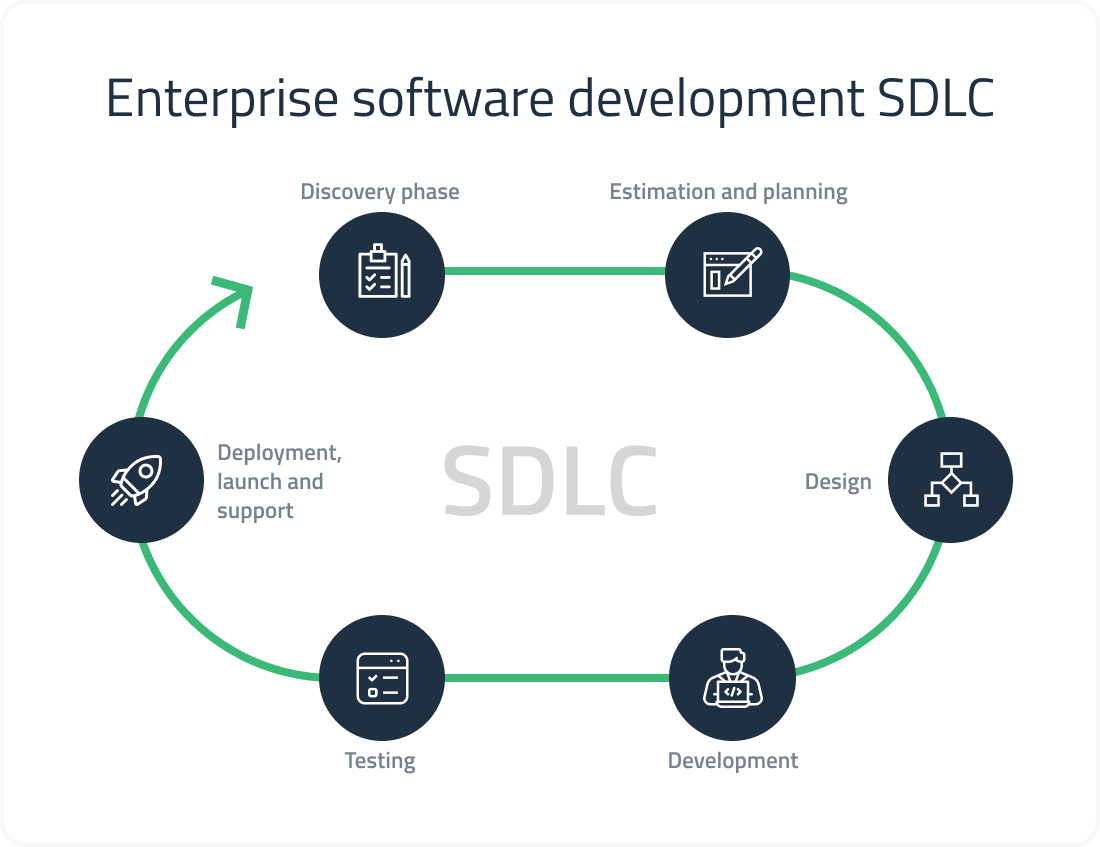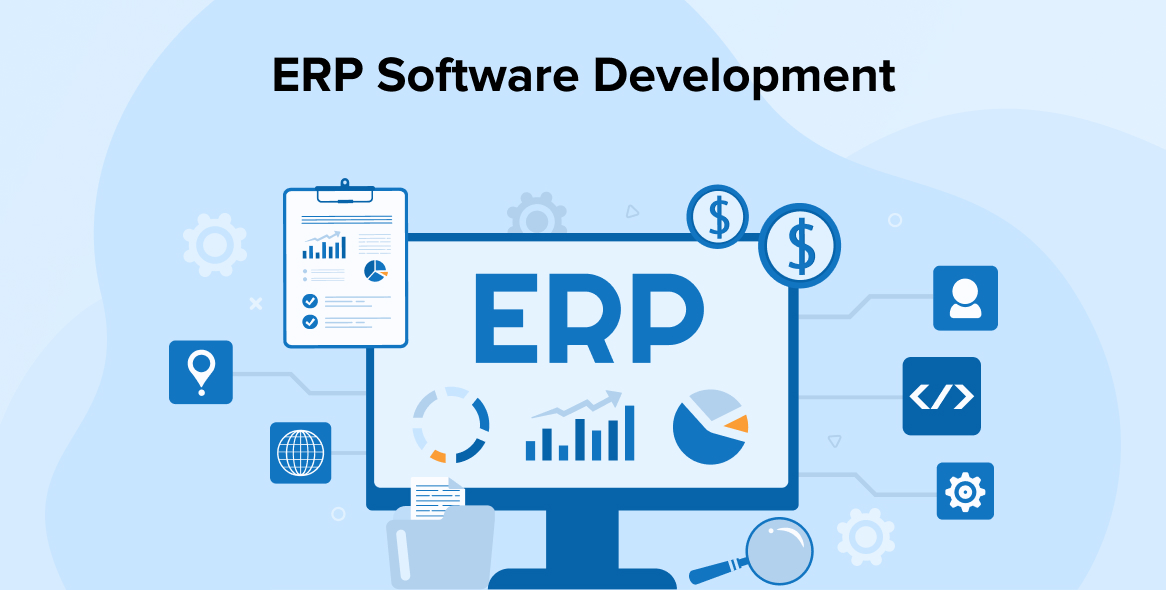Enterprise software development involves creating applications for large organizations. These applications streamline processes and improve efficiency.
In today’s fast-paced world, businesses need robust solutions to stay competitive. Enterprise software is tailored to meet specific organizational needs. It handles complex tasks and integrates various systems. This type of software supports business operations and decision-making. It’s vital for growth and innovation.
Understanding enterprise software development is crucial for businesses aiming to optimize their workflows. As technology evolves, so do the demands on software systems. Companies must adapt to these changes to thrive. Dive into the world of enterprise software development to explore how it transforms business operations and sets the stage for future success.
Credit: www.scnsoft.com
Introduction To Enterprise Software
Enterprise software plays a crucial role in today’s business landscape. It is designed to meet the unique demands of large organizations. This type of software helps streamline operations and improve efficiency. It supports various functions like customer relationship management and supply chain management. Understanding enterprise software is essential for businesses striving for growth.
Significance In Modern Business
Enterprise software is vital for businesses today. It facilitates smooth operations across departments. It allows for better data management and integration. This software enables businesses to make informed decisions. It supports collaboration and enhances productivity. It also ensures compliance with industry regulations. Enterprise software is indispensable for modern enterprises.
Key Characteristics
Enterprise software has distinct features. Scalability is crucial for growing businesses. It supports complex processes and large user bases. Security is a top priority for enterprise applications. They protect sensitive data from breaches. Customization is another key aspect. Businesses can tailor software to fit their needs. Integration with existing systems is essential. Enterprise software should easily connect with other applications.
Benefits Of Enterprise Software
Enterprise software development boosts productivity and efficiency by streamlining business processes. It offers customized solutions that address specific organizational needs. Enhanced collaboration and data management improve overall decision-making.
Enterprise software is a powerful tool for businesses seeking to enhance their operations. It offers a range of advantages that can transform how you work. Whether you’re looking to boost productivity or ensure your business can grow with ease, enterprise software provides solutions tailored to your needs. Let’s dive into two of the most compelling benefits: efficiency and scalability.
Efficiency And Productivity
Imagine your daily tasks streamlined and automated, freeing you to focus on what truly matters. Enterprise software can do just that. It reduces manual work by automating repetitive tasks, saving you time and minimizing errors.
Think about the last time you struggled with a mountain of paperwork or data entry. With enterprise software, those tasks become a breeze. It integrates various functions, allowing seamless data flow across departments. This means faster decision-making and more time for innovation.
Now, consider your team. Enterprise software fosters collaboration with shared tools and resources. Your team can work more efficiently, leading to increased productivity. When everyone has access to the information they need, your business moves forward swiftly.
Scalability And Flexibility
Growth is exciting, but it comes with its challenges. Enterprise software helps you tackle these by being scalable. As your business expands, the software adapts, supporting more users and larger data volumes without a hitch.
You might have experienced rapid growth that left you scrambling to update systems or hire more staff. With enterprise software, scalability is built-in. You can easily add new features or integrate third-party solutions to meet changing demands. This flexibility is crucial in today’s fast-paced business environment.
Moreover, enterprise software provides the flexibility to customize solutions to fit your unique needs. You’re not locked into rigid processes or systems. Instead, you can tailor the software to match your business model and goals. This adaptability is key to maintaining a competitive edge.
So, how will you leverage enterprise software to transform your business? The benefits are clear, but the choice is yours. As you consider these advantages, think about the impact on your operations and growth. Are you ready to take the leap and embrace the change?
Types Of Enterprise Software
Enterprise software development is a powerhouse driving efficiency in modern businesses. Understanding the types of enterprise software can help you select the right tools to meet your organization’s needs. Whether you’re managing customer relations or optimizing resources, the right software can make all the difference in your operations.
Customer Relationship Management
Customer Relationship Management (CRM) software is like your company’s front desk, but digital. It helps you manage your interactions with clients and prospects. Imagine never missing a follow-up or losing track of a customer’s preferences. That’s the beauty of CRM.
Consider CRM as your personal assistant. It organizes contacts, tracks sales, and automates marketing tasks. You can gain insights into customer behavior and tailor your approach to meet their needs. With CRM, you are not just managing customers; you’re building lasting relationships.
Have you ever felt overwhelmed by the sheer volume of customer data? CRM software streamlines this information, making it easily accessible and actionable. You can focus on what truly matters: satisfying your customers and growing your business.
Enterprise Resource Planning
Enterprise Resource Planning (ERP) software is the backbone of your business operations. It integrates various functions like finance, HR, and supply chain into a single system. This connectivity allows for seamless data flow across departments.
ERP is like having a bird’s eye view of your business. You gain visibility into every aspect, from inventory levels to employee performance. This comprehensive overview can lead to informed decision-making and strategic planning.
Think about a time when you struggled to align various departments. ERP software eliminates this challenge by ensuring that everyone works from the same playbook. It fosters collaboration and efficiency, turning chaos into order.
Choosing the right enterprise software is more than a tech decision—it’s a strategy. Which type of enterprise software aligns with your company’s goals? How can these tools transform your daily operations? Consider these questions and embark on the journey to optimize your enterprise systems.
Choosing The Right Software
Choosing the right enterprise software can transform business operations. The key is matching software features with specific business needs. This ensures efficiency and productivity.
Assessing Business Needs
Begin by identifying core business challenges. List the tasks that need improvement or automation. Consider the size of your company and its growth plans. This helps you focus on relevant software features. Collaborate with team members to get varied insights. Their input is valuable in understanding different departmental needs. It aids in forming a comprehensive view of requirements.
Evaluating Software Options
Research available software solutions thoroughly. Compare features, pricing, and support services. Read user reviews and case studies for real-world insights. Assess the software’s scalability and integration capabilities. Ensure it aligns with your current systems. Don’t forget to check vendor reliability and reputation. This minimizes risks and ensures long-term partnership benefits.
Custom Vs. Off-the-shelf Solutions
Choosing the right software can impact business growth and efficiency. Businesses often face a dilemma: custom solutions or off-the-shelf software? Both have unique advantages and challenges. Understanding these can guide your decision.
Advantages Of Custom Solutions
Custom software meets specific business needs. It offers tailored features for unique processes. With custom solutions, businesses can scale effortlessly. Adapt to changes in the market with ease. Security is another benefit. Custom software often includes robust protection. It reduces the risk of common vulnerabilities. Integration with existing systems is smoother. Custom software fits like a glove.
When To Choose Off-the-shelf
Off-the-shelf solutions suit businesses with common needs. They offer faster implementation. No need to wait for development. These solutions are often cost-effective. Perfect for businesses with tight budgets. Frequent updates and support are common. This ensures software stays up-to-date. Off-the-shelf software is user-friendly. It often includes intuitive interfaces and detailed guides.
Implementation Strategies
Effective implementation strategies in enterprise software development focus on clear objectives and organized workflows. Teams prioritize collaboration, ensuring smooth integration and timely delivery. Identifying potential challenges early enhances project success.
Implementing enterprise software development requires well-thought-out strategies to ensure success. It’s not just about writing code; it’s about making sure the software integrates smoothly into existing systems and that everyone involved is on the same page. This process can be daunting, but with the right approach, it can be rewarding and transformative for your organization.
Planning And Preparation
The cornerstone of any successful implementation is thorough planning and preparation. Begin by defining clear objectives. What exactly do you want the software to achieve?
Once objectives are set, assemble a team with diverse skills. A mix of technical experts and end-users will offer a balanced perspective. Ensure that there’s a project manager to keep the team focused and organized.
Create a timeline with milestones. It helps in tracking progress and maintaining momentum. Regular check-ins can prevent small issues from becoming big problems.
Change Management
Change management is crucial in easing the transition to new software. Resistance to change is natural, but it can be managed effectively. Start by communicating the benefits clearly to everyone involved.
Training sessions can bridge the gap between old and new systems. Interactive workshops encourage engagement and ease concerns. Encourage questions and provide hands-on support.
Feedback loops are vital. They allow you to make adjustments based on user experiences. By addressing concerns promptly, you show that you value input and are committed to a smooth transition.
Are you ready to transform your enterprise software development with these strategies? By focusing on planning and preparation, along with effective change management, you’re setting the stage for a successful implementation.
Challenges In Development
Navigating enterprise software development involves tackling complex integration, scalability, and security issues. Teams must ensure seamless compatibility across diverse systems. Efficient solutions require careful coordination and innovative problem-solving.
Enterprise software development is a complex field, filled with numerous challenges that can stall progress and inflate costs. These challenges often stem from the intricate nature of integrating new software with existing systems and ensuring robust security. As technology evolves, so do these hurdles, requiring developers to be both innovative and vigilant.
Integration Issues
Integration is often like piecing together a jigsaw puzzle where some pieces just don’t fit. You might face compatibility issues between new and legacy systems, which can lead to data silos. Imagine spending hours trying to make new software communicate with an old database that just won’t cooperate. It’s frustrating, right?
Developers can tackle these issues by thoroughly understanding the architecture of both systems. They can also use middleware to bridge gaps. Have you considered open-source solutions? They often offer flexibility and community support.
Security Concerns
Security is a critical concern in enterprise software development. With cyber threats becoming more sophisticated, protecting sensitive data is non-negotiable. Just think about how a single breach could compromise your customers’ trust.
Developers must implement strong encryption and regularly update security protocols. Are you conducting regular security audits? They can identify vulnerabilities before they become problems. Incorporating multi-factor authentication is another practical step to enhance security. Remember, proactive measures are always better than reactive fixes.
Navigating these challenges requires a blend of technical skill and strategic thinking. By addressing integration issues and security concerns head-on, you can create robust enterprise software that stands the test of time. What strategies have you found effective in overcoming these challenges?

Credit: diceus.com
Future Trends In Enterprise Software
Enterprise software development is evolving rapidly. Businesses seek efficient and innovative solutions. Understanding future trends is crucial for staying competitive. Let’s explore key trends shaping enterprise software.
Artificial Intelligence Integration
AI is transforming enterprise software. It offers smarter solutions. AI enhances decision-making processes. Predictive analytics is one application. It helps businesses anticipate needs. AI-driven chatbots improve customer service. They provide instant responses. Automation of routine tasks saves time. It increases productivity. AI integration is becoming essential for enterprises.
Cloud-based Solutions
Cloud technology is vital in enterprise software. It offers flexibility. Cloud solutions enable remote work. They provide access from anywhere. This increases efficiency. Cloud services offer scalable resources. Businesses can adjust needs easily. Data security remains a top priority. Cloud providers ensure robust protection. Cloud-based solutions support digital transformation.
Case Studies
Enterprise software development is a dynamic field where real-world examples offer valuable insights. Case studies highlight how businesses have leveraged software solutions to transform operations, improve efficiency, and drive growth. By examining these, you can glean practical lessons that apply to your own organization, making the path to success clearer and more achievable.
Successful Implementations
Several companies have embraced enterprise software development with remarkable outcomes. Consider a retail company that streamlined its inventory management system. Before software integration, they faced frequent stock-outs and overstock issues. By implementing a tailored software solution, they achieved real-time inventory tracking. This not only optimized stock levels but also boosted customer satisfaction.
Another example is a healthcare provider enhancing patient data management. With custom software, they improved data accuracy and accessibility. This led to better patient care and operational efficiency. Imagine how similar tools could revolutionize your industry.
Lessons Learned
Not every implementation is flawless, but each provides a learning opportunity. One tech company rushed deployment without adequate testing. The result was frequent system crashes, impacting productivity. They learned the critical importance of thorough testing before launch.
Another business struggled with user adoption. Employees resisted change due to lack of training. They realized that comprehensive training sessions are essential for smooth transitions. How can you ensure your team is ready for change?
These case studies emphasize the importance of preparation and adaptability. Success lies in understanding your unique needs and challenges. Are you ready to apply these lessons to your enterprise software journey?

Credit: www.tatvasoft.com
Frequently Asked Questions
What Is Enterprise Software Development?
Enterprise software development involves creating customized applications for organizations to streamline operations and improve efficiency. It targets large-scale business needs, integrating various processes and systems. This development focuses on scalability, security, and compatibility, ensuring the software meets specific organizational requirements and enhances overall productivity.
What Does An Enterprise Developer Do?
An enterprise developer creates, tests, and maintains software solutions for businesses. They ensure applications meet business needs and integrate seamlessly. These developers collaborate with IT teams to enhance system performance and security. They also update software to align with evolving business processes and technologies.
Which Is An Example Of Enterprise Software?
SAP ERP is an example of enterprise software. It helps organizations manage business operations and customer relations effectively.
What Is The Difference Between Enterprise Software Development And Regular Software Development?
Enterprise software development focuses on large-scale business solutions, while regular software development targets individual or small-scale needs. Enterprise solutions require higher scalability, security, and integration capabilities. They often involve complex systems and multi-user environments, whereas regular software is usually simpler and tailored for specific tasks or users.
Conclusion
Enterprise software development offers incredible benefits for businesses. It streamlines operations efficiently. This software enhances productivity and supports scalability. Teams can collaborate better, leading to improved outcomes. Choosing the right software partner is crucial. It ensures tailored solutions fit your needs.
Embrace technology to stay competitive in today’s market. Invest in reliable software to drive success. Remember, the right tools empower your business growth. Focus on quality and innovation. Success lies in adapting to change. Achieve goals with strategic software decisions.
Keep evolving to meet industry demands. Your business future depends on smart choices today.






